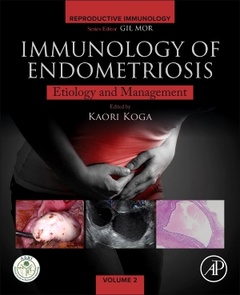Immunology of Endometriosis Pathogenesis and Management Reproductive Immunology Series
Coordonnateur : Koga Kaori

L.G.C. Riccio and M.S. Abrão
2. Macrophages in endometriosis: they came, they saw, they conquered
Kavita Panir, Mary Louise Hull, and Erin Greaves
3. Dendritic cells
Gentaro Izumi
4. Immune factors in the pathogenesis and the potential therapeutic target of endometriosis 1e4 neutrophils
Masashi Takamura
5. Role of Th1, Th2, Th17, and regulatory T cells in endometriosis
Khaleque N. Khan, Akira Fujishita, Yukiko Tanaka, and Jo Kitawaki
6. Auto-immunity and endometriosis: evidence, mechanism and therapeutic potential
Tao Zhang, Tin-Chiu Li, and Chi-Chiu Wang
7. Role of estrogen and estrogen-related factors in endometriosis
Taisuke Mori and Jo Kitawaki
8. Immune factors in the pathogenesis and the potential therapeutic target of endometriosis
Wan-Ning Li, Meng Hsing Wu, and Shaw-Jenq Tsai
9. The roles and functions of macrophages in endometriosis
Miaomiao Ji, Xue Jiao, Sun-Wei Guo, and Guoyun Wang
10. The role of immune factors in endometriosis-related conditions, 2-1 pain
Fabio Barra, Giulio Evangelisti, Carolina Scala, and Simone Ferrero
11. Immune phenotypes and mediators affecting endometrial function in women with endometriosis
Linda C. Giudice and Julia Vallve Juanico
12. The role of immune factors in endometriosis-related conditions, 2e3 ovarian dysfunction
Michio Kitajima
13. The role of immune-related redox biology in malignant transformation of endometriosis
Hiroshi Kobayashi
14. Pregnancy complications
Louis Marcellin, Pietro Santulli, and Charles Chapron
15. Prevalent innate and adaptive immune mechanisms in endometriosis
Ryan M. Marks, Harshavardhan Lingegowda, Alison McCallion, Anushka Nair, and Chandrakant Tayade
16. Novel therapeutic strategy: antiinflammatory reagents
Hiroaki Komatsu, Fuminori Taniguchi, and Tasuku Harada
17. Gut microbiota and endometriosis
Osamu Yoshino, Yosuke Ono, and Takehiro Hiraoka
18. Immunosuppression and immunotherapy in endometriosis: review of pathophysiology, recent development and future perspectives
Ying He, Kennes Sze Wan Hung, Hui Xu, and Chi Chiu Wang
19. Novel diagnostic strategies for endometriosis
Mathew Leonardi, Jodie Avery, and M. Louise Hull
1. Based on your assessment of the proposal, in your view who is the audience for the project (what field)?
R1: medical and research.
R2: researchers, Clinicians and trainees working in the field of endometriosis
- Provides detailed immunological background to help readers understand etiology and management of endometriosis
- Evaluates various immunological factors that are involved in the pathogenesis of endometriosis
- Presents a detailed evaluation of the knowledge related to each immune cell type in endometriosis
Date de parution : 12-2021
Ouvrage de 348 p.
15.2x22.8 cm
Thèmes d’Immunology of Endometriosis :
Mots-clés :
Animal model; Antibodies; Antioxidants; Arginase 1Endometriosis; Aromatase; Autoantibodies; Autoimmune disease; Autoimmunity; B cell; B cells; B lymphocytes; Biomarkers; Bowel complications; Burn-out hypothesis; CD11c-DTR mouse; cDC2 subpopulation; Cesarean section; Chemokines; Cyclical repair; Cytokine; Cytokines; Decidualization; Dendritic cells; Dysmenorrhea; Endometrioma; Endometriosis; Endometriosis-associated ovarian cancerImmune response; Endometriotic stromal cell (ESC)Macrophage inflammatory protein (MIP)Subfertility; Endometrium; Estrogen receptor; Estrogen; Estrogens; Fibrosis; Follicular fluid; Gutmicrobiota; Hyperalgesia; Hypoxia; IL-17Innate immunity; Immune cells; Immune dysfunction; Immunocomplex; Immunology; Immunomodulatory therapies; Immunomodulatory therapy; Immunosuppression; Immunotherapy; Infertility; Inflammation; Inflammatory; Innate immune cells; Interferon; Isoflavone; Macrophage; Macrophages; Malignant transformation; Menstrual cycle; Microenvironment; Microrna; Nerve growth factor; Neuroangiogenesis; Neuropeptide; Neutrophil extracellular traps; Neutrophils; Nuclear factor-kappaB; Ovarian reserve; Oxidative stress; Patophysiology; Peritoneal cavity; PGC-1a Pregnancy; Preterm birth; Proinflammatory cytokines; Proinflammatory endometrium; Proinflammatory environment; Redox biology; Remodeling; Substance P; T cell; T lymphocytes; TGF-ßTh17 cells; TH17Th2Therapy; Treg cells; T-reg; Triage test; Tumor necrosis factor; Tumor-associated macrophages (TAM)Uterine rupture; VEGF
